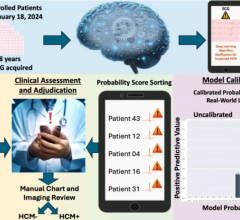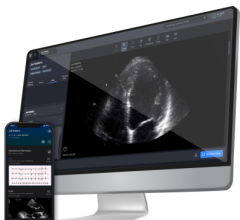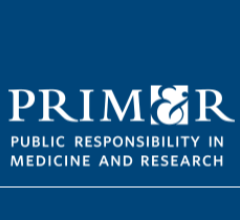
December 19, 2019 — The U.S. Food and Drug Administration (FDA) has granted breakthrough status for a novel ECG-based algorithm that could provide an easily accessible screening test for heart failure. Developed by Eko, a digital health company applying artificial intelligence (AI) in heart disease, the algorithm analyzes 15 seconds of ECG data collected from the Eko Duo digital stethoscope. The data can be collected during a physical exam and helps identify reduced left ventricular ejection fraction (LVEF), a measure commonly used to diagnose patients with heart failure.
FDA Breakthrough Device designation helps accelerate the algorithm’s regulatory review and is only awarded to novel innovations that demonstrate the potential to address unmet medical needs for life-threatening or irreversibly debilitating diseases.
Heart failure affects about 5.7 million people in the U.S. alone and is most commonly detected by echocardiogram imaging tests that are not normally conducted during a physical exam. Because of limited access to echocardiography, heart failure is frequently diagnosed late, making life-prolonging treatment more challenging.
“The Breakthrough Device designation recognizes the vast unmet clinical needs in identifying heart failure early in patients, whether it be due to cost, inaccessibility, or misdiagnosis,” said Connor Landgraf, CEO and co-founder of Eko. “We look forward to working with the FDA to bring this algorithm to patients and to give clinicians a new tool to screen for low ejection fraction.”
“A low ejection fraction means that the heart pump is weak, which can lead to shortness of breath, swelling, exercise intolerance, or sudden death, so it is important to identify, as many treatments exist,” said Paul Friedman, M.D., chair of the Department of Cardiovascular Medicine, Mayo Clinic, Rochester, Minn. “This technology gives physicians a tool to detect heart disease earlier, and before it develops into a more serious illness. In effect, by imbedding the technology in a commonly used clinical tool – the stethoscope – all caregivers carry some of the diagnostic prowess of an expert cardiologist with them.”
Peer-Reviewed Data on Eko AI Algorithm Already Available
Eko’s low ejection fraction algorithm employs a deep neural network developed in collaboration with Mayo Clinic. The algorithm was first announced in a landmark publication in Nature Medicine in January 2019. In further clinical studies at Mayo Clinic, the DUO combined with the AI algorithm was able to detect ejection fraction < 35% with an area under the curve (AUC) of 0.90.
Mayo Clinic and Friedman have a financial interest in the technology referenced in this news release. Mayo Clinic will use any revenue it receives to support its not-for-profit mission in patient care, education and research.
The FDA’s Breakthrough Device program helps patients gain more timely access to medical devices by expediting their development, assessment, and review, while preserving the statutory standard of reasonable assurance of safety and effectiveness for premarket approval and the statutory standards for granting a de novo request. This status does not mean the algorithm has received FDA clearance.
Eko is building software, devices, and analysis algorithms for in-clinic heart disease screening, telemedicine, and monitoring patients at home. Its FDA cleared platform is used by thousands of clinicians treating tens of millions of patients around the world. The Eko DUO was named a 2019 Fast Company World Changing Ideas Finalist.
For more information: ekohealth.com


 September 24, 2025
September 24, 2025 









